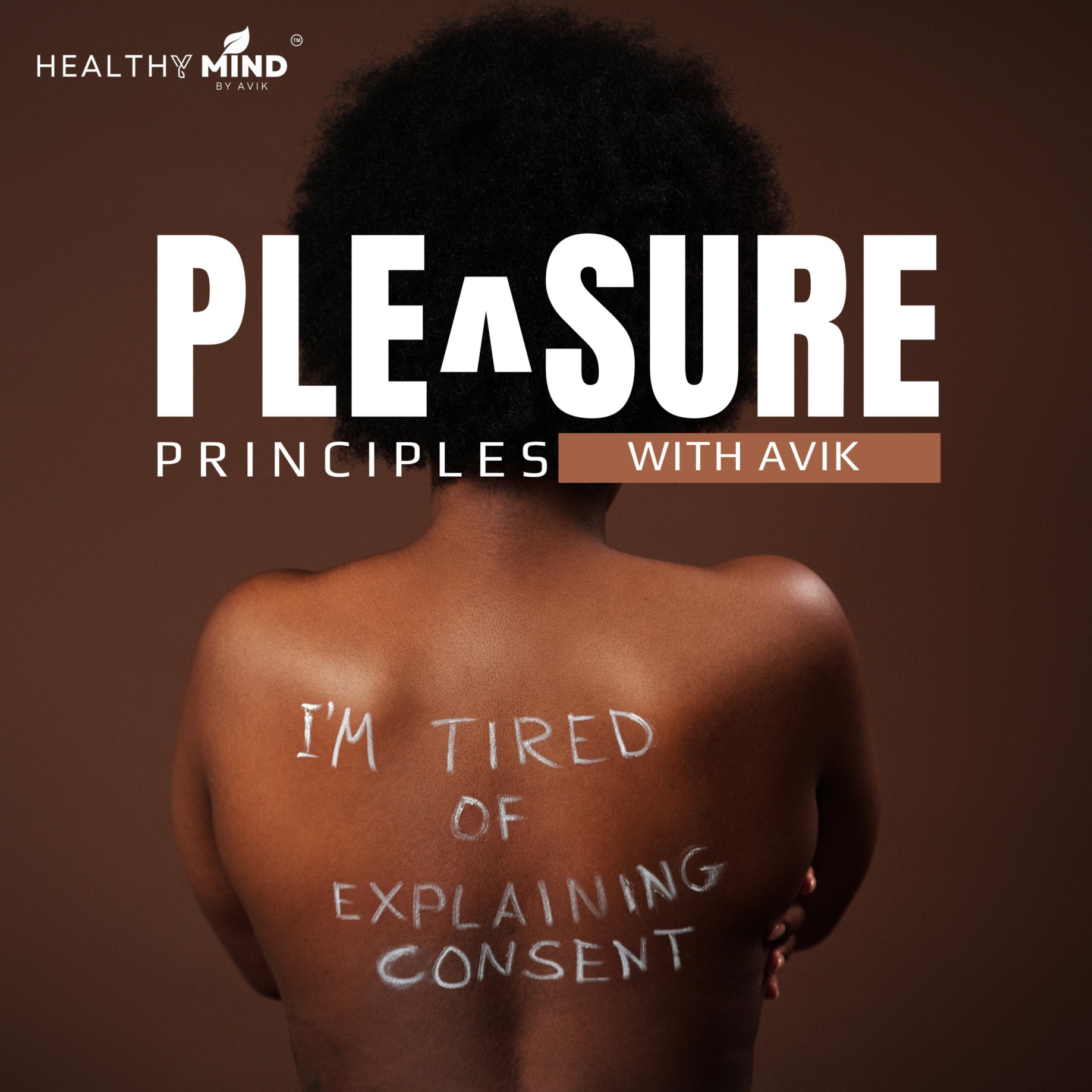
Mind Over Masculinity
Let’s stop asking men to "man up" and start asking how we can lift them up. After all, mental health is not just a women’s issue or a men’s issue—it’s a human issue.
Take the first step today. Talk, listen, and advocate. Together, we can make a difference.
Mind Over Masculinity
Overcoming 'Man-Up' Pressures: Embracing Vulnerability and Personal Growth for Men's Mental Transformation
Imagine growing up with a cloud of doubt hanging over your self-worth and intelligence, all because of an absent father. This week on Mind Over Masculinity, we welcome Kevin Palmeri, the insightful mind behind Next Level University, to guide us through his deeply personal journey of resilience and self-discovery. Kevin's unique upbringing, shaped by strong women, offers him a distinctive lens on the pressures men face to "man up" amidst traditional masculine expectations. His story unveils how societal pressures can become invisible cages that limit our potential, often without our conscious awareness.
Join us as we uncover the crucial role shared core values play in nurturing meaningful relationships. Kevin and I dissect the internal battles many of us face—how personal fears and self-sabotage can dictate our interactions more than external expectations. We provide actionable strategies for confronting these fears, from breaking them into smaller, manageable parts to engaging in exposure therapy to build confidence. By embracing these challenges and viewing them as opportunities for growth, we can redefine our identities and transform obstacles into stepping stones for personal development.
Automate Social Media Post
Make Short Clips From Long Videos
Loved by 4M+ marketers, entrepreneurs & creators
Create and translate videos
Create and translate videos with HeyGen's AI Video Generator
Buzzsprout Podcasting
Disclaimer: This post contains affiliate links. If you make a purchase, I may receive a commission at no extra cost to you.
-----------------------------------------------------------------------------------------------------------------
Want to be a guest on Mind Over Masculinity? Send me a message.
-----------------------------------------------------------------------------------------------------------------
Stay Tuned And Follow Us!
- YouTube - https://www.youtube.com/@healthymind-healthylife
- Instagram - https://www.instagram.com/podhealth.club/
- Threads - https://www.threads.net/@podhealth.club
- Facebook - https://www.facebook.com/podcast.healthymind
- LinkedIn - https://www.linkedin.com/in/newandnew/
Hey, dear listeners, welcome back to another enlightening episode of Mind Over Masculinity, the show where we challenge traditional notions of manhood, explore the uncharted territories of men's mental health and empower you to thrive. I'm your host, avik, and today we are diving into a topic that resonates universally but often goes unnoticed Overcoming limiting beliefs. Yes, so joining me is someone whose journey redefines resilience and reinvention. I'm talking about Kevin Pellery. So welcome to the show, kevin. Journey redefines resilience and reinvention. I'm talking about Kevin Pellery, so welcome to the show, kevin.
Speaker 2:Avik, thank you so very much for having me. You and I have had the pleasure of chatting before, so I'm excited to chat about masculinity today.
Speaker 1:Lovely, lovely, nice to having you here again, and so I'd quickly love to introduce you again on here to all of the listeners. Dear listeners, kevin is the founder and host of Next Level University, a globally celebrated podcast with over 1900 episodes and millions of listeners. So he turned a life altering, rock bottom moment into the cornerstones of a million dollar business and an inspiring movement for holistic self-improvement. So, kevin, welcome to the show and let's break down some walls today.
Speaker 2:Let's do it. Like I said, yeah, let's do it, let's do it. I'm excited, lovely.
Speaker 1:So what, according to you? I mean, what's the most significant limiting belief that you have had to overcome? I mean, if you can share, yeah.
Speaker 2:Yeah, of course. So when I was young, my father left. So I do not know. Well, I didn't know my father, with the understanding that he was my father until I was 27. So I think the first and probably deepest limiting belief I ever had was I wasn't good enough, I wasn't smart enough and I was not of value. Because in my mind, if I was good enough, if I was smart enough, if I was of value, my dad probably wouldn't have left. So I think that's probably the first and deepest limiting belief I have ever had.
Speaker 1:I would say belief I have ever had, I would say Wow, understood. So I mean so, when you recognize this belief, that was there aha moment, or was it more a gradual awakening?
Speaker 2:I would. Yeah, I would say it was a gradual awakening, because what I think what happens most commonly with a limiting belief is a limiting belief is downloaded in some way, shape or form and then you kind of just live your life that way because it almost seems like there are certain things that are not accessible to you. Because within your identity, I identify as somebody who's not smart enough, so I couldn't go to college. I identify as somebody who isn't good enough, so I could never be successful. I identify as somebody who isn't valuable, so I could never have anybody that really valued me. And then you start playing it safe and that's kind of the lane that you say in A really good example.
Speaker 2:If somebody walks up to you when you're a little kid and they say, oh, you're so shy, that might end up being a limiting belief for you, and then when somebody says, are there any questions? You don't raise your hand because you've self identified as shy and that just becomes your existence. So, yeah, I would say it was just something that I learned over time. It wasn't something that I woke up one day and said, wow, this is the limiting belief. When I started to work on self-improvement and when I started to practice more self-awareness. I asked myself what are some of the patterns that I feel like I've experienced that pattern connected to the limiting belief, and then from there I was able to explore it a little bit deeper, and then that was the beginning of the journey, at least.
Speaker 1:Understood and it's fascinating like how often those beliefs shape our reality without us even realizing it. So I mean, hearing your story, kevin, I mean makes me wonder, like how many of us are walking around in invisible cages.
Speaker 2:Everyone I think everybody has. Because here's the thing there are some people out there that think they can do anything, and again, I'm not saying that's a bad belief to have, but it becomes a potentially limiting belief if you have so much belief in yourself that you choose to do nothing with it. It's not helping you, not sound the way that mine sound. My business partner, his limiting belief was if I am successful, all of the people in my life will leave me. It's a different one than I have. For me, my limiting belief was I will never be successful. So we have very different limiting beliefs, but I think it's important to understand that. Yeah, everybody has limiting beliefs to a degree. It's just what does it sound like, what does it feel like? Is it similar to other people's or is it very unique? And then how do you react to it? But I think it's safe to say that everybody has their own version of limiting beliefs.
Speaker 1:Exactly, exactly, I totally agree. And um, uh, men often grow up with these societal pressures like like, uh, I I mentioned in in our podcast. So mind over masculinity, which clearly states, uh, one thing is is very, very important saying that let's stop asking men to man up and start asking how we can lift them up. So, because it's all about the mental health, it's not about women's or men's issues. So from here, like it's, it's a social, social pressures that men often grow up to man up or kind of push through without addressing deeper issues. So I mean, how did you reconcile this traditional masculine expectation with your journey of self-improvement?
Speaker 2:Yeah One. I was raised by women, so I think that, right off the bat, does something a little bit different for me. I didn't have a man in my life saying rub some dirt in it. It's not okay to cry, toughen up. I didn't have a man that was looking over my shoulder saying that. So I had a different idea of what healthy was. I think that's one piece. The other piece is and I learned this in my mid-20s and I learned this in my mid-20s If, by definition, something is really hard to do, you doing it does not suggest you are weak.
Speaker 2:So let's say this, let's say somebody out there is listening right now and they say well, therapy suggests weakness. No, therapy is a really challenging thing to do, depending on who you are and what your relationship is with it, and it requires strength to do it. I think it is brave to go talk to somebody about the way you're feeling, because there's a lot of stuff in there that's scary to talk about. I think that's something that I had pretty early on. I mean, in my mid-20s I went to therapy and that was one of the best things I ever did. And then, when I started podcasting and when I started talking to people. I realized that if you are willing to talk about something that a lot of people are struggling with, it's one of the best ways to add value into people's lives.
Speaker 2:So I was on a. I was interviewing somebody one time and we were talking about how I had dealt with an addiction to pornography in my past and we got off the episode and my business partner said to me I can't believe you said that I don't know anybody that would say that on a podcast. And I said I can only imagine how many people listening are dealing with the same thing. They're just not willing to say it. Dealing with the same thing. They're just not willing to say it.
Speaker 2:So I think there's something about leading the charge when it comes to being vulnerable and talking about stuff that really matters, and this is the last thing I won't say. I've always. But the thing that really helped me was understanding that for every slap on one cheek I get, I'll probably get a kiss on the other cheek I get, I'll probably get a kiss on the other cheek. And all I mean by that is, for every negative message I get, maybe I'll get one, two, five, 10 positive messages, and the positive messages always mean more to me, so that's a thing that's really helped me too.
Speaker 2:And I think the other thing too, and it takes time to really lean into this and learn this but we all have insecurities and we all have limiting beliefs and unless you face the limiting beliefs, the belief, or you face the insecurity, it runs your life forever. Say to yourself well, I can't do this because and I just I think if we understood that we are putting so many beliefs on ourselves that we can knock down. It's not easy, it's challenging, but I do think it's deeply worth it.
Speaker 1:I understand and what would you say I mean in terms of men's relationships, whether romantic, familial or maybe friendships?
Speaker 2:I would say somebody has to go first when it comes to vulnerability. So one of the best things I ever did I had two really, really good friends when I was in my mid to late 20s, and one of the best things ever is when I would in my mid to late 20s, and one of the best things ever is when I would spend time with them and I was getting ready to leave, I would hug them and I would say I love you, brother, and that opened up like this new style of communication where we could actually be vulnerable with each other and tell each other how we felt about each other, and tell each other how much we meant to each other. And I think it just if you're afraid of judgment from the people around you, if somebody goes first and shows you that they're willing to be judged, I think it makes you feel safer. So that's one thing I would say. The other thing I would say is the relationships that you'll probably find work the best in your life are probably the ones that have similar core values, similar core beliefs and similar core aspirations. So if growing up, let's say, you had a strict parent and their belief was crying equals weakness, that unfortunately might end up becoming what your belief is. But if you start talking to your friends or maybe it's a loved one, a partner, close family, distant family, whatever it is and you start to realize that their beliefs are different than the beliefs that you were raised with, it might create the opportunity for you to grow through that. But that's really the three things that, at least from what I've seen, it really affects relationships, core values what do you value as a human? I value vulnerability. I value communication.
Speaker 2:Core beliefs what do you believe about yourself? What do you believe about the world? What do you believe about the universe? What do you believe? And then core aspirations what do you feel like you're here to do? What do you believe about yourself? What do you believe about the world? What do you believe about the universe? What do you believe? And then core aspirations what do you feel like you're here to do? What do you want to do with your life? What do you want to accomplish? I'm willing to bet that the relationships that are the most satisfying to you are probably the ones that have the most similarities amongst those three things.
Speaker 1:So that means you're saying it mostly stem more from the internal struggles than the external expectations?
Speaker 2:I think yeah, well, I think it's a mix right? If you're somebody who was raised in a certain way, then it becomes internal and external, because that's what you saw growing up and that's what you model internally. If you're somebody who has a lot of self-belief, I think it really depends on what your perspective is. I think it's ultimately a game of perspective. If you were by yourself and you weren't worried about what anybody would think, would you cry or not? If the answer is no, I will never cry. It's probably more internal than external. That's kind of how I look at it, because you're not not doing it because of external pressure, you're not doing it because of an internal belief. So that's how I see it. It really depends on why would you do something versus why wouldn't you. If it's, I wouldn't do something because there's people around. Maybe that's external. If it's, I wouldn't do something because that's not something I do. I'd say that's probably more of an internal game.
Speaker 1:Lovely, I mean really. Relationships often mirror our inner struggles. So fixing those dynamics starts with fixing ourselves 100%. Yeah, yeah, yeah. And also like, when we're talking about this, so fear and self-sabotage, which we are talking about. So fear often drives self-sabotage, so how did you confront your fears? I mean, what do you think? I mean, what advice would you give to them? Duperman?
Speaker 2:I would say that, number one, you have to be courageous enough to admit what the fear is, regardless of how it seems. So a lot of the things that I was afraid of were I mean, I'm willing to bet a lot of people might be embarrassed to admit that Understandable right, especially if you're afraid of judgment. I always suggest that you break your fears into micro fears. So a lot of people are afraid to fly Awesome. Maybe, instead of going on a flight from Boston to London, which is six hours over an ocean at night, you focus on creating some level of smaller fear that you can conquer. I think a lot of us have an all or nothing mentality and unfortunately, when it's all or nothing, it's very easy for it to be nothing. Unfortunately, when it's all or nothing, it's very easy for it to be nothing. So I always suggest breaking the fear up into something smaller. I didn't start when I when I was becoming a speaker, I didn't start speaking in front of giant audiences. I started by speaking in front of like 50 people and honestly, that was probably too many. I probably would have done better if there was only like 10 people in the audience. But eventually, as you do it long enough. It's essentially something called exposure therapy, where you expose yourself to the thing that you're afraid of. It becomes more normal, you become more comfortable with it, you become more certain of how it works and then you you can make it a habit to what we do. What we call is fear chasing. So if you can make it a daily habit to go out of your way, to face some fear or do something uncomfortable, a really good example of that is yes, I know you can order all of your food on apps now and you don't have to call people and talk to people. But if you're nervous to have conversations with people, next time you order pizza call the pizza place. Next time you have to buy something, go to the store instead of just ordering it on Amazon If you don't like human interaction. It might seem like silly things that don't do anything, but you're quite literally starting the process of exposure therapy. So those are all really big pieces. The other thing I would add is you have to have a deep belief that it's actually worth doing. So I'm probably not going to go lie in a snake pit anytime soon. I just don't feel like it's worth facing that fear, as opposed to if I want to speak internationally. I have to get over my fear of planes, so that's something that's actually worth doing and it's deeply meaningful. And then eventually, when you do it long enough, you start to adopt the identity of I am the type of person who faces fears. And then let's we'll quickly pivot to.
Speaker 2:A lot of what I just mentioned were kind of external fears. It to. A lot of what I just mentioned were kind of external fears. Internal fears might be. I'm in a relationship and I want to bring something up with my partner about how I am afraid of this, or I have this truth that I want to express. So a couple different ways you can do it. You can design opportunities within your relationship where you can bring up those things, so we call them check-ins, which you can do, those every week where a Vic and I sit down and I say, hey, there's something that's been bothering me lately, is this something we could talk about today? Or you just give little micro feedback along the way, give little micro feedback along the way. So I think the biggest lesson I could impart is make the big fears a little bit smaller, because you don't eat the whole meal at once, you eat it in little bites, and that's the only real way to digest anything.
Speaker 1:Wow, that's a lovely saying. Yeah, great. What an incredible conversation today, kevin, I mean definitely your. Your story is a testament to the power of uh, vulnerability, perseverance and, um, sheer definitely will to rise above the noise of limiting beliefs.
Speaker 2:So I appreciate it. I appreciate you having me, my friend. I appreciate the conversation and's. Yeah, if it's hard to do, you doing it does not make you weak, it makes you strong and I think that reframe right there is.
Speaker 1:There's a lot of opportunity within that reframe mind over masculinity, and if you have loved today's episode, share it with a friend or someone whom you love the most, subscribe and leave us a review. Together, we we are redefining what it means to be a strong and emotionally intelligent man. So until next time, this is your host, avik signing off. Stay strong, stay open and let's keep breaking the boundaries. So thank you so much.







